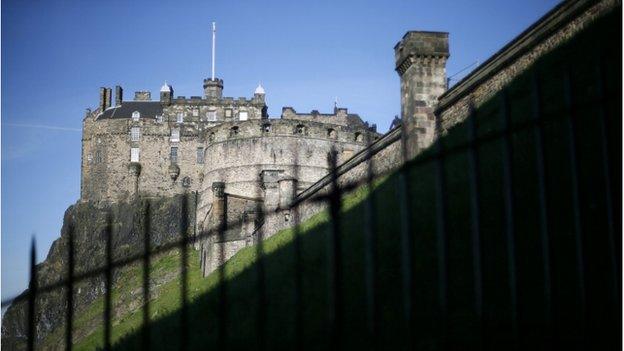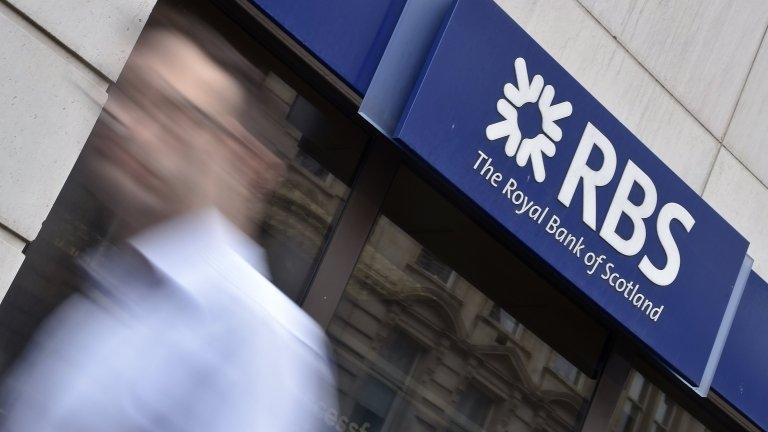Scotland: Why would banks shift tax headquarters south?
- Published

Why would banks want to move their tax "home" to England?
Banks and financial services firms have said they will move their tax headquarters, and in some cases part of their operations, to England in the event of a vote for Scottish independence.
Royal Bank of Scotland and Lloyds Banking Group said they would "re-domicile" their main groups south of the border if there were a Yes vote.
Tesco Bank would also "re-domicile" in England, Clydesdale Bank would re-register as English, and TSB would also "re-domicile" parts of its business.
But what does that actually mean?
'Re-domiciling'
According to Patrick Stevens, tax policy director at the Chartered Institute of Taxation, large companies typically "re-domicile" to take advantage of perks offered by a particular country's tax regime.
It's helpful to think of a company having to have a "home" for tax purposes. To move that "home", multinationals make a holding company tax resident in a particular country.
Holding companies are useful because subsidiary companies in a group can funnel profits up to the holding vehicle. The subsidiary firm may have its own tax residency in a different country.
Multinationals typically want to be tax resident in the UK rather than elsewhere because tax rules are more "friendly" than in other countries, such as the US, Mr Stevens said.
For example, in the UK, when a holding company distributes profits as dividends to shareholders, the company does not pay tax on the profits, but it does in the US.
This becomes especially interesting for companies if their subsidiaries are tax resident in countries with lenient tax rules.
For example, if a subsidiary or "operating" company is tax resident in a place such as the Cayman Islands, which has no corporation tax, then profits can be funnelled up to the holding company in the UK, and distributed to shareholders as dividends, without the company paying tax on those dividends.
If there is a majority Yes vote in Scotland, when it becomes independent it will have the same friendly regime as the rest of the UK. However, the two parallel sets of rules would gradually diverge over time, Mr Stevens said.
It may be that an independent Scotland's tax regime is eventually more attractive to multinational companies than the UK.
However, there's no indication that Scotland would become either more or less attractive to holding companies.
An uncertain world
So, why then would the banks want to shift tax-residency to England? The overwhelming answer from them is that it provides more certainty.
For RBS, said Mr Stevens, "there are a number of material uncertainties arising from the Scottish referendum vote which could have a bearing on the bank's credit ratings, and the fiscal, monetary, legal and regulatory landscape to which it is subject".
RBS, and the other banks, need to have a "lender of last resort" to fall back on. That is, they need a central bank they can go to if they need bailing out.
For RBS and the others, that "lender of last resort" is the Bank of England, which also acts as a regulator.
In addition, uncertainty could cause credit ratings agencies to think it more likely that a bank would default on a debt, and to say that lending to that bank is more risky.
Jobs shift?
The banks have said that a tax shift south would not involve major upheavals for staff. An RBS spokeswoman told the BBC that a re-domicile would not be a case of "lifting and shifting of buildings and people".
Lloyds said shifting its group tax residency from Edinburgh to London would see "no immediate changes or issues which could affect" its business. And Clydesdale's parent company National Australia Bank said that "any change to the company's [Clydesdale's] legal structure would have no impact on the vast majority of the bank's staff".
All of the banks insisted that the change would be "legal and technical" and would not involve many jobs shifting out of Scotland.
However, Mr Stevens points out that to be tax resident in a country, the directors of the holding company almost certainly need to be located there, and the treasury functions of the holding company also need to be there.
So, for example, the finance director, and most of the support for the finance director, need to be located in the country where the holding company is legally based.
The 'great unknown'
If the people of Scotland decide they want to be independent, it is "a great unknown" what the eventual tax system will look like north of the border, Mr Stevens said.
It's possible that a future Scottish government decides that it wants to make it attractive for multinationals to base holding companies in Scotland, just as the UK government decided about 15 years ago to alter tax rules, and to make the tax landscape look very different.
However, there are some politicians in the UK, and there may be some in a future Scotland, who decide that multinationals have too-easy-a-ride, and that holding companies could be a way make multinationals pay more tax.
Like the outcome of the referendum itself, it's very difficult to see what the eventual tax outcome will be.
However, one thing is certain: banks want to move their tax "homes" south as a backstop in the event of Scottish independence.
- Published11 September 2014

- Published11 September 2014

- Published8 September 2014